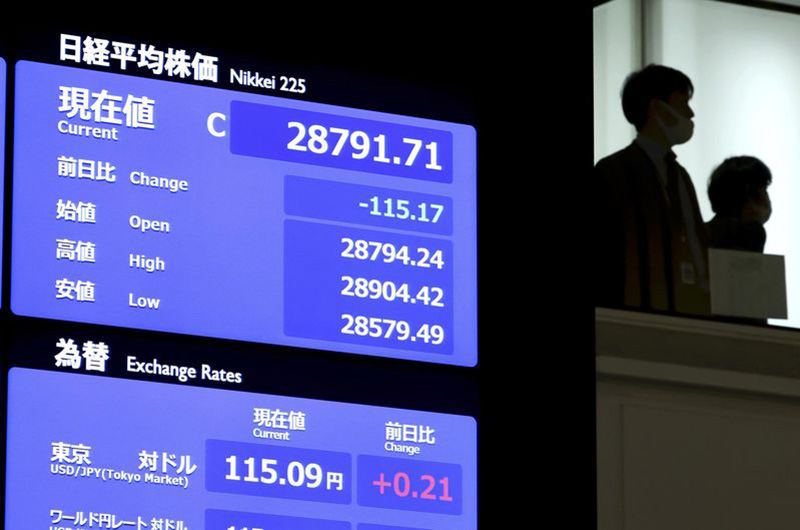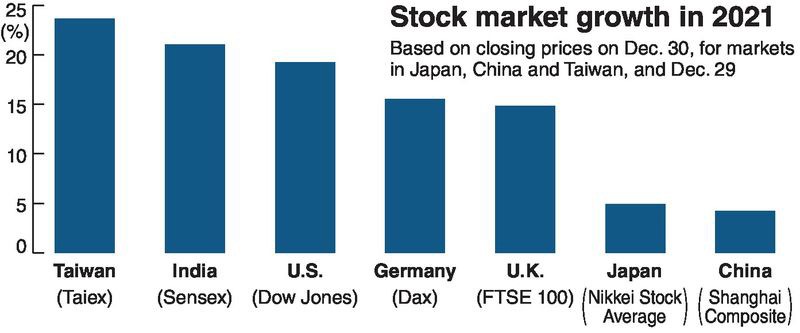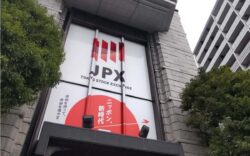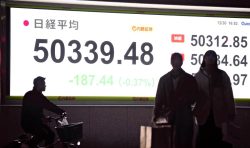
A board showing the closing price of the Nikkei Stock Average at the Tokyo Stock Exchange on Thursday.
16:49 JST, December 31, 2021
In 2021, the benchmark 225-issue Nikkei Stock Average on the Tokyo Stock Exchange exceeded 30,000 for the first time in more than 30 years, hovering high thanks to a recovery in corporate earnings and global monetary easing.
But compared to overseas markets, growth was sluggish.
Central banks in Europe, the United States and elsewhere are expected to seek an exit from monetary easing in 2022, making it likely that stock markets supported by ample funds will change course, which would have a knock-on effect on the Japanese market.
“Following on from 2020, it was a busy year with the novel coronavirus pandemic and the response to the crisis, but the market remained relatively strong,” said Japan Exchange Group Inc. CEO Akira Kiyota at a Tokyo Stock Exchange ceremony to mark the final trading day of the year on Thursday.

The difference between the Nikkei average’s highest and lowest levels in 2021 was 3,656 points.
Compared to the previous year, when the difference was 11,015 points amid many ups and downs following the outbreak of the pandemic, it was less turbulent, but it could also be a sign that trading was sluggish.
“Delays in the vaccination rollout and the strained capacity of medical services led to repeated state-of-emergency declarations and a stall in consumer spending, meaning stocks were unable to stay at the 30,000 level,” said a Daiwa Securities Co. strategist.
The Nikkei has conspicuously lagged behind markets in Europe and the United States. The Nikkei average rose by 4.9% since the beginning of the year, while the U.S. Dow Jones industrial average of 30 companies increased by 19.2%.
In the United States, home to tech giants that have benefited from the accelerated digitization of society due to the pandemic, the Dow Jones industrial average and the Nasdaq composite index reached record highs.
The Nikkei average hit the 30,000 level for the first time in 30 and a half years, but it is still far from the end-of-year record of 38,915 logged in 1989.
“Compared to the United States and Europe, the economic recovery has been delayed in Japan due to the slow normalization of economic activities. In addition, the public and private sectors haven’t presented clear growth strategies, and as a result, many foreign investors are doubtful about the future growth of the Japanese economy,” said Tetsufumi Yamakawa of Barclays Securities Japan Ltd.
To improve stock prices, Yamakawa said, “It’s essential to increase the liquidity of employment through deregulation, raise wages and improve productivity.”
Monetary policy changes are also likely to influence stock prices.
Yutaka Miura of Mizuho Securities Co. predicted that March 2022 would be a turning point because the U.S. Federal Reserve Board will end its quantitative easing program and finish laying the groundwork for an interest rate hike, which is expected to take place sometime in 2022.
In order to stimulate the pandemic-hit economy, the central bank has continued its monetary easing policy, pumping large amounts of money into the market, boosting stock prices.
Reducing monetary easing and raising interest rates, “will shut the taps from which funds have been pouring,” said Miura. “This will have a negative impact on U.S. stocks, which will put downward pressure on vulnerable Japanese stocks as well.”
The omicron variant is spreading in Europe and the United States. Other concerns include the worsening relationship between the United States and China and a slowdown in the Chinese economy.
Market attention will also be focused on the administration of Prime Minister Fumio Kishida.
When Kishida expressed willingness to review the taxation on financial income, such as dividends and capital gains from stock sales, the market took a negative view, and stock prices fell sharply as a result.
“Any statement that lacks consideration for market movements will cause concern among foreign investors and may lead to volatility in stock prices,” said Norihiro Fujito of Mitsubishi UFJ Morgan Stanley Securities Co.
Top Articles in Business
-

Prudential Life Insurance Plans to Fully Compensate for Damages Caused by Fraudulent Actions Without Waiting for Third-Party Committee Review
-

Narita Airport, Startup in Japan Demonstrate Machine to Compress Clothes for Tourists to Prevent People from Abandoning Suitcases
-

Japan, U.S. Name 3 Inaugural Investment Projects; Reached Agreement After Considerable Difficulty
-

JR Tokai, Shizuoka Pref. Agree on Water Resources for Maglev Train Construction
-

Toyota Motor Group Firm to Sell Clean Energy Greenhouses for Strawberries
JN ACCESS RANKING
-

Japan PM Takaichi’s Cabinet Resigns en Masse
-

Japan Institute to Use Domestic Commercial Optical Lattice Clock to Set Japan Standard Time
-

Israeli Ambassador to Japan Speaks about Japan’s Role in the Reconstruction of Gaza
-

Man Infected with Measles Reportedly Dined at Restaurant in Tokyo Station
-

Videos Plagiarized, Reposted with False Subtitles Claiming ‘Ryukyu Belongs to China’; Anti-China False Information Also Posted in Japan






















